-
 Bitcoin
Bitcoin $103,668.9987
1.66% -
 Ethereum
Ethereum $2,645.0693
8.80% -
 Tether USDt
Tether USDt $1.0000
-0.01% -
 XRP
XRP $2.5609
4.94% -
 Solana
Solana $180.3728
6.89% -
 BNB
BNB $659.9335
2.07% -
 USDC
USDC $1.0001
0.01% -
 Dogecoin
Dogecoin $0.2378
8.03% -
 Cardano
Cardano $0.8185
4.39% -
 TRON
TRON $0.2714
2.99% -
 Sui
Sui $3.9685
2.05% -
 Chainlink
Chainlink $17.2043
5.91% -
 Avalanche
Avalanche $26.0497
9.53% -
 Stellar
Stellar $0.3101
3.19% -
 Shiba Inu
Shiba Inu $0.0...01612
7.18% -
 Pi
Pi $1.2670
22.11% -
 Hedera
Hedera $0.2121
3.88% -
 Hyperliquid
Hyperliquid $25.5834
8.04% -
 Toncoin
Toncoin $3.4249
5.72% -
 Polkadot
Polkadot $5.1723
6.25% -
 UNUS SED LEO
UNUS SED LEO $8.7934
2.30% -
 Bitcoin Cash
Bitcoin Cash $407.5382
2.52% -
 Litecoin
Litecoin $103.8516
3.63% -
 Monero
Monero $343.7295
3.06% -
 Pepe
Pepe $0.0...01390
6.66% -
 Bitget Token
Bitget Token $4.7986
3.73% -
 Dai
Dai $0.9999
-0.02% -
 Ethena USDe
Ethena USDe $1.0006
0.00% -
 Uniswap
Uniswap $6.9232
4.81% -
 Bittensor
Bittensor $459.6444
2.76%
How to verify the integrity of backup files through blockchain technology?
Blockchain's immutability and cryptographic hashing ensure backup integrity. A file's unique hash, stored on the blockchain, acts as a tamper-evident record, automatically verified by smart contracts. Decentralized storage adds another layer of security.
Mar 03, 2025 at 08:30 pm
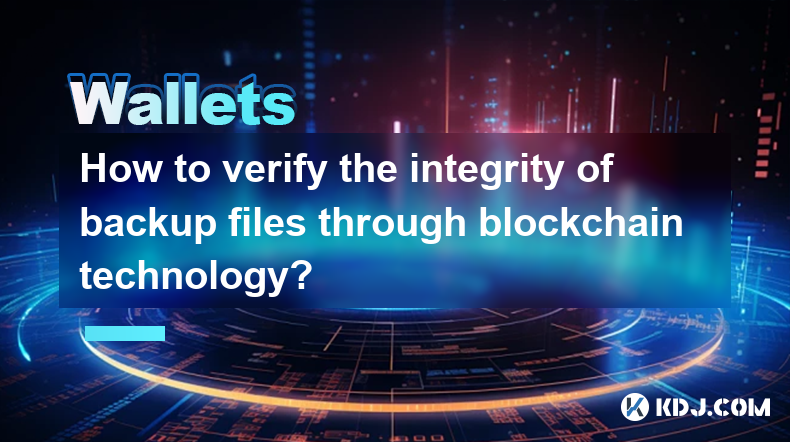
Key Points:
- Blockchain's immutability ensures the verification of backup integrity.
- Hashing algorithms create a unique fingerprint of the backup file.
- This hash is stored on the blockchain, acting as a tamper-evident record.
- Smart contracts automate the verification process.
- Decentralized storage solutions enhance security and reliability.
How to Verify the Integrity of Backup Files Through Blockchain Technology?
Data integrity is paramount, especially in the cryptocurrency world where even minor alterations can lead to significant financial losses. Blockchain technology, with its inherent immutability and transparency, offers a powerful solution for verifying the integrity of backup files. This involves leveraging cryptographic hashing and smart contracts to create a secure and auditable system.
The first step involves creating a cryptographic hash of your backup file. A hashing algorithm, like SHA-256, takes your file as input and generates a unique, fixed-size string of characters. This string acts as a digital fingerprint for your backup. Even a tiny change in the file will drastically alter the hash value.
Next, this hash value is recorded on a blockchain. This action creates a permanent and tamper-evident record of the backup file's integrity at a specific point in time. Because the blockchain is immutable, any subsequent attempt to alter the backup file will result in a different hash, immediately revealing the tampering.
Smart contracts can further automate this process. A smart contract can be programmed to compare the hash of the original backup file with the hash of the restored file. If the hashes match, the contract verifies the integrity of the backup. If they differ, it signals a potential compromise.
Choosing the right blockchain is crucial. Public blockchains like Ethereum offer transparency and decentralization, but can be more expensive. Private blockchains provide more control and potentially lower costs, but sacrifice some transparency. The choice depends on your specific needs and security requirements.
Decentralized storage solutions, combined with blockchain technology, provide an extra layer of security. Instead of storing the backup file itself on the blockchain (which is inefficient), you store it on a decentralized storage network like IPFS and only record its hash on the blockchain. This ensures the backup's availability even if one storage node fails.
This approach offers several advantages over traditional methods. Traditional methods often rely on trust in a single entity, which is a potential point of failure. Blockchain removes this single point of failure, offering a more robust and secure system.
The process of verification itself is straightforward. To verify the integrity of a restored backup file, you simply generate its hash and compare it to the hash stored on the blockchain. A match confirms the integrity; a mismatch indicates corruption or tampering.
Utilizing Different Blockchain Platforms
Different blockchain platforms offer varied functionalities and costs. Ethereum, known for its smart contract capabilities, is a popular choice. However, its transaction fees can be significant. Other platforms like Hyperledger Fabric, designed for private blockchains, may be more cost-effective for internal use cases. The selection depends on factors like scalability, cost, and the level of decentralization required.
Security Considerations and Best Practices
While blockchain technology significantly enhances security, additional measures are crucial. Strong encryption of the backup file itself is essential to prevent unauthorized access even if the hash is compromised. Regular backups and a multi-factor authentication system for accessing the blockchain and the backup files are also recommended best practices. Additionally, securely storing your private keys is paramount to maintain control over your data and its verification process.
Integrating with Existing Systems
Integrating this system into existing workflows might require custom development. APIs provided by blockchain platforms and decentralized storage networks can facilitate this integration. The complexity of integration depends on the existing infrastructure and the chosen blockchain platform. It’s vital to consider the technical expertise needed for implementation and maintenance.
Cost Implications and Scalability
Using blockchain for backup integrity verification incurs costs associated with transaction fees on the blockchain and potentially decentralized storage fees. The scalability of the solution depends on the chosen blockchain platform and the volume of backups being managed. Cost-effective solutions often involve a combination of private and public blockchain elements.
Frequently Asked Questions:
Q: Is this method foolproof?
A: While highly secure, no method is completely foolproof. Compromising the private keys used to access the blockchain or the decentralized storage would still allow malicious actors to manipulate the system. However, this is significantly more challenging than tampering with a traditional backup system.
Q: What if the blockchain itself is compromised?
A: The likelihood of a major blockchain like Ethereum being compromised is extremely low due to its decentralized nature and robust cryptographic security. However, using a reputable and well-established blockchain is crucial to minimize this risk.
Q: How expensive is it to use blockchain for backup verification?
A: The cost depends on the blockchain platform, transaction fees, and storage costs. Public blockchains generally have higher transaction fees than private ones. Choosing a cost-effective blockchain platform and minimizing unnecessary transactions is key.
Q: Can I use this for personal backups, or is it only for businesses?
A: This method can be applied to both personal and business backups. However, the cost-benefit analysis might differ depending on the scale and sensitivity of the data being backed up.
Q: What happens if the hash doesn't match?
A: A mismatch indicates that the backup file has been altered or corrupted since the hash was recorded on the blockchain. This triggers an alert, indicating a potential security breach or data loss. Investigation is then required to determine the cause of the mismatch.
Disclaimer:info@kdj.com
The information provided is not trading advice. kdj.com does not assume any responsibility for any investments made based on the information provided in this article. Cryptocurrencies are highly volatile and it is highly recommended that you invest with caution after thorough research!
If you believe that the content used on this website infringes your copyright, please contact us immediately (info@kdj.com) and we will delete it promptly.
- Qubetics Emerges as the Infrastructure-Backed Project to Watch, Outperforming All Other Cryptos in ROI Projections
- 2025-05-14 11:05:13
- Toncoin (TON) Shows Early Signs of Consolidation After Notable Rally
- 2025-05-14 11:05:13
- While PEPE and SHIB Chase Pumps, Web3 ai Builds Real AI Tools With Huge ROI Potential of 1747%
- 2025-05-14 11:00:30
- title: Crypto Market Poised to Replicate the Dot-com Bubble, Triggered by a Surge in Internet Adoption
- 2025-05-14 11:00:30
- OM (OM) Token Could Hit $1 Soon: Here's a Grounded Take
- 2025-05-14 10:55:13
- XRP Price To Still Rally To $1,000
- 2025-05-14 10:55:13
Related knowledge
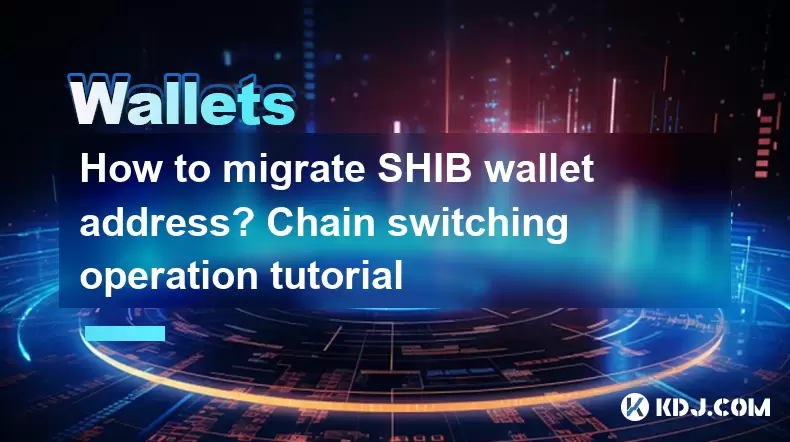
How to migrate SHIB wallet address? Chain switching operation tutorial
May 14,2025 at 07:35am
Migrating your SHIB wallet address and performing a chain switching operation can be crucial for managing your cryptocurrency effectively. This process involves several steps that need to be followed carefully to ensure that your assets remain secure and accessible. In this tutorial, we will guide you through the process of migrating your SHIB wallet ad...
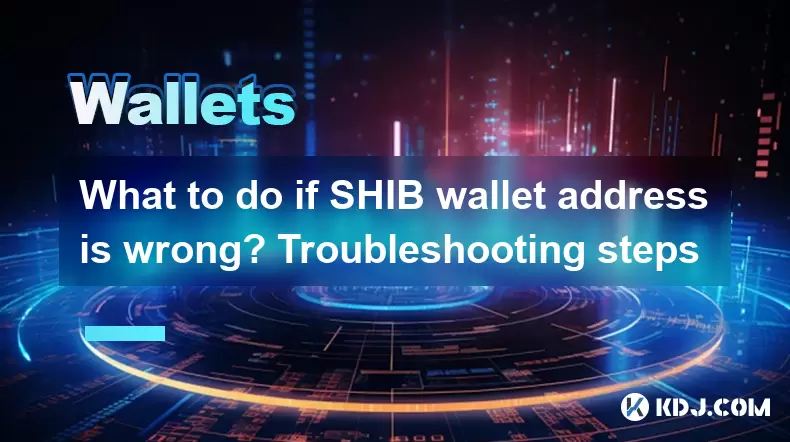
What to do if SHIB wallet address is wrong? Troubleshooting steps
May 14,2025 at 04:28am
If you've entered the wrong SHIB wallet address, it can be a stressful situation, especially if you've already sent your SHIB tokens. However, there are several steps you can take to troubleshoot and potentially resolve the issue. Let's walk through the process step-by-step. Verify the Transaction DetailsThe first thing you should do is verify the trans...
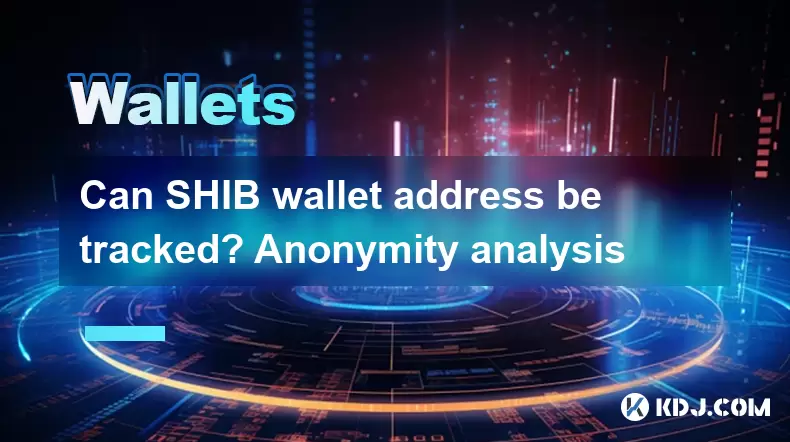
Can SHIB wallet address be tracked? Anonymity analysis
May 14,2025 at 06:50am
The question of whether a SHIB wallet address can be tracked and the level of anonymity it provides is a crucial concern for many users in the cryptocurrency space. SHIB, or Shiba Inu, is a popular meme token that operates on the Ethereum blockchain. Understanding the traceability of SHIB wallet addresses involves delving into the nature of blockchain t...
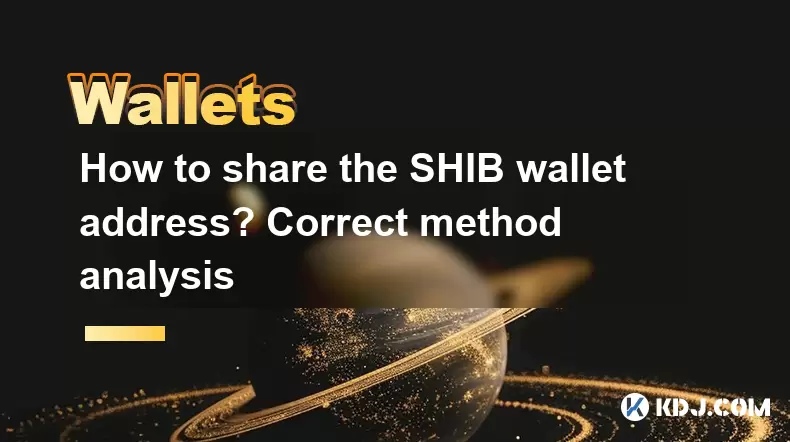
How to share the SHIB wallet address? Correct method analysis
May 14,2025 at 02:50am
Sharing your SHIB wallet address is a common task for those involved in the cryptocurrency world, particularly if you're dealing with Shiba Inu (SHIB) tokens. However, it's crucial to understand the correct methods to share your wallet address to ensure the safety and security of your funds. This article will guide you through the process and highlight ...
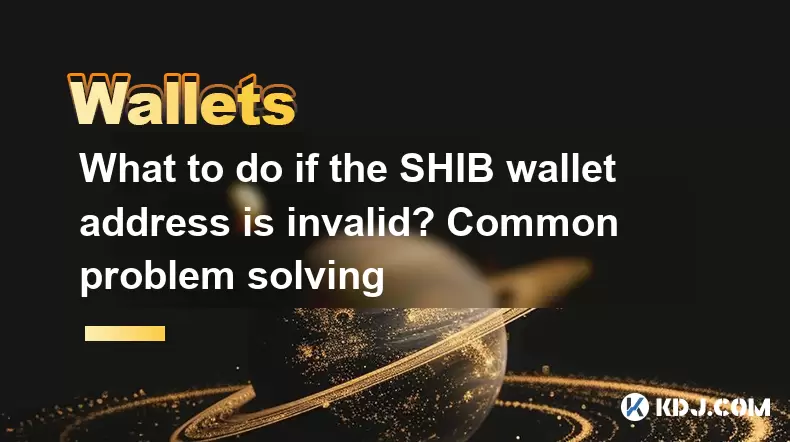
What to do if the SHIB wallet address is invalid? Common problem solving
May 14,2025 at 09:14am
If you're dealing with an invalid SHIB wallet address, it can be a frustrating experience, especially if you're trying to send or receive SHIB tokens. Understanding why this happens and how to solve it is crucial for anyone involved in the cryptocurrency space. This article will guide you through the common issues associated with an invalid SHIB wallet ...
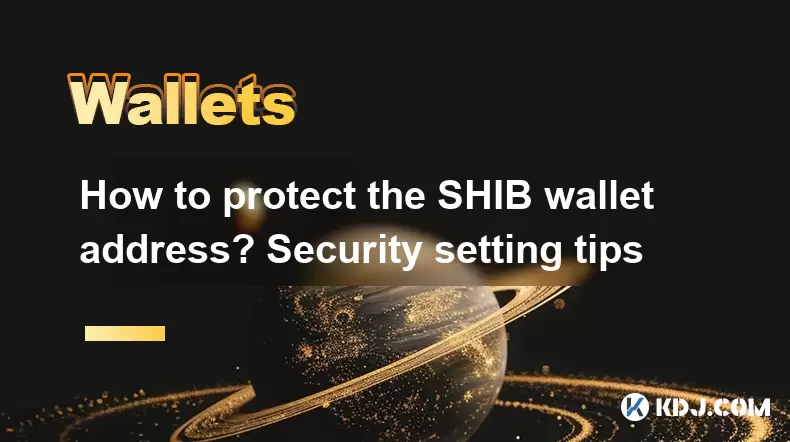
How to protect the SHIB wallet address? Security setting tips
May 13,2025 at 04:07pm
Protecting your SHIB wallet address is crucial to safeguarding your cryptocurrency assets. With the rise of digital currencies, securing your wallet has become more important than ever. This article will provide you with detailed security setting tips to ensure your SHIB wallet remains safe from potential threats. Understanding SHIB Wallet SecurityBefor...

How to migrate SHIB wallet address? Chain switching operation tutorial
May 14,2025 at 07:35am
Migrating your SHIB wallet address and performing a chain switching operation can be crucial for managing your cryptocurrency effectively. This process involves several steps that need to be followed carefully to ensure that your assets remain secure and accessible. In this tutorial, we will guide you through the process of migrating your SHIB wallet ad...

What to do if SHIB wallet address is wrong? Troubleshooting steps
May 14,2025 at 04:28am
If you've entered the wrong SHIB wallet address, it can be a stressful situation, especially if you've already sent your SHIB tokens. However, there are several steps you can take to troubleshoot and potentially resolve the issue. Let's walk through the process step-by-step. Verify the Transaction DetailsThe first thing you should do is verify the trans...

Can SHIB wallet address be tracked? Anonymity analysis
May 14,2025 at 06:50am
The question of whether a SHIB wallet address can be tracked and the level of anonymity it provides is a crucial concern for many users in the cryptocurrency space. SHIB, or Shiba Inu, is a popular meme token that operates on the Ethereum blockchain. Understanding the traceability of SHIB wallet addresses involves delving into the nature of blockchain t...

How to share the SHIB wallet address? Correct method analysis
May 14,2025 at 02:50am
Sharing your SHIB wallet address is a common task for those involved in the cryptocurrency world, particularly if you're dealing with Shiba Inu (SHIB) tokens. However, it's crucial to understand the correct methods to share your wallet address to ensure the safety and security of your funds. This article will guide you through the process and highlight ...

What to do if the SHIB wallet address is invalid? Common problem solving
May 14,2025 at 09:14am
If you're dealing with an invalid SHIB wallet address, it can be a frustrating experience, especially if you're trying to send or receive SHIB tokens. Understanding why this happens and how to solve it is crucial for anyone involved in the cryptocurrency space. This article will guide you through the common issues associated with an invalid SHIB wallet ...

How to protect the SHIB wallet address? Security setting tips
May 13,2025 at 04:07pm
Protecting your SHIB wallet address is crucial to safeguarding your cryptocurrency assets. With the rise of digital currencies, securing your wallet has become more important than ever. This article will provide you with detailed security setting tips to ensure your SHIB wallet remains safe from potential threats. Understanding SHIB Wallet SecurityBefor...
See all articles






















































































